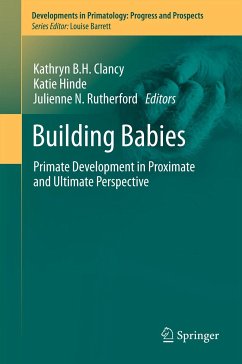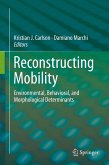Building Babies features multi- and trans-disciplinary research approaches to primate developmental trajectories and is particularly useful for researchers and instructors in anthropology, animal behavior, psychology, and evolutionary biology. This book also serves as a supplement to upper-level undergraduate courses or graduate seminars on primate life history and development. In these contexts, the book provides exposure to a wide range of methodological and theoretical perspectives on developmental trajectories and models how researchers might productively integrate such approaches into their own work.
Dieser Download kann aus rechtlichen Gründen nur mit Rechnungsadresse in A, B, BG, CY, CZ, D, DK, EW, E, FIN, F, GR, HR, H, IRL, I, LT, L, LR, M, NL, PL, P, R, S, SLO, SK ausgeliefert werden.
"The volume contains an impressive collection of contributions by over 30 authors. ... It is a book that will be of great value to a wide range of researchers and students in primatology, reproductive physiology, behavior, and evolutionary biology in general. The concluding chapter by Robert D. Martin is a real gem. ... He identifies a number of paradoxes and unresolved issues. This final chapter is both an excellent place to begin reading Building babies, and a starting point for future research on the topic." (John G. Fleagle, The Quarterly Review of Biology, Vol. 88 (2), June, 2013)
"This exciting collection brings multiple perspectives to the challenge of understanding human and nonhuman primate development. ... The importance of early life experiences and social relationships in shaping primate development and the explanatory power of an evolutionary perspective ... are themes that run through the book. ... Chapters draw on data from laboratory investigations, captive studies, and/or research on wild-living populations and highlight the insights that are gained when diverse approaches are used. Summing Up: Highly recommended. Upper-division undergraduates and above." (S. Stinson, Choice, Vol. 50 (7), March, 2013)









